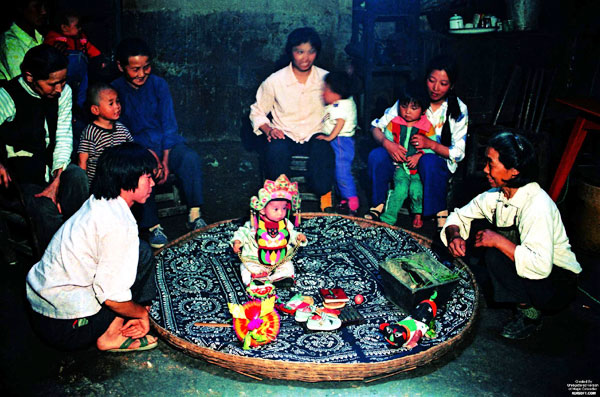| Tools: Save | Print | E-mail | Most Read |
| Cultural Treasures: Zhuazhou |
| Adjust font size: |
Zhuazhou is regarded as one of the most important customs on a child's first birthday. When a family has a child, the family members want to know what the child will be when he or she grows up. Parents place an assortment of articles in front of their child to choose from. The things the child chooses determine his or her future inclination and capabilities. The earliest written record of this custom can be traced back to the Song Dynasty 1,000 years ago. In the late Qing Dynasty 100 years ago, this custom prevailed in Beijing. Zhuazhou is not an occasion for grand feasts and elaborate gifts. The hosts do not even send out invitations. The idea is that relatives will show up spontaneously to celebrate the child's first birthday. Gifts from relatives on this day are usually not costly and do not include items such as gold or silver jewelry. Instead, dim sum or toys are presented to the child. The Zhuazhou ceremony usually takes place before the longevity noodle at lunchtime. A wealthy family will install a table on the bed (or "kang," a heated brick bed used in northern China) where stamps, classic Confucian, Buddhist and Taoist books, a Chinese brush pen, ink, paper, an ink stone, abacus, coins, an accounting book, jewelry, flowers, rouge, food and toys are placed. If the baby is female, the following items are added: a scoop, spoon (representing cooking utensils), scissors, ruler (representing sewing items), thread and a design book (representing embroidery). The practice, however, is much more simple in a common family. Usually, a bronze tray instead of a table is placed on the kang and a book from old-style private schools, like the Three-Character Primer, is put on top, including a Chinese brush pen, abacus and a cake. Scissors, shears and a ruler are added for a girl. The parents then seat the baby in front of the table or the tray. Without help or guidance from anyone, the baby is then free to choose anything in front of him or her. The selected items he or she chooses are used to foretell the child's interests, career and inclination in the future. Selecting the stamp means the child will be an officer in the future. If he or she chooses the stationery first, the baby will be industrious and endowed with great literary talents. The abacus suggests a penchant for statistics and financie. A girl who first grabs a sewing item or cooking utensil will be a good housewife. On the other hand, if a child picks a cake or a toy, he or she will know how to enjoy the pleasures in life. There is an old Chinese saying: "You can know a child's future when he is very young." A famous Chinese writer and painter, Feng Zikai, said he chose a Chinese brush pen at his Zhuazhou ceremony. His family let him study literature and he really liked it. He then lived with a pen all his life. Parents and relatives pin high hope on the future of their children. The custom of Zhuazhou is a method of expressing their good wishes. The custom of Zhuazhou reflects how parents, grandparents and other relatives will encourage the child and how they will conduct enlightenment education. Even though some parents may not be superstitious, they will still carry on the custom. This is also why the custom has been passed on through so many generations and is still practiced to this day. Zhuazhou in modern China is a little different from before. The items have changed considerably. Many parents put a computer mouse, calculator, dollar bill, colored pen, CD, violin, book, cell phone, or ball in front of their children. These things represent modern careers. A computer mouse means the child will pursue an IT career. A dollar bill means the child will become a businessperson. A CD or violin means the child will be interested in music.
(CRI.com December 18, 2006) |
| Tools: Save | Print | E-mail | Most Read |
 |
| Related Stories |
|
